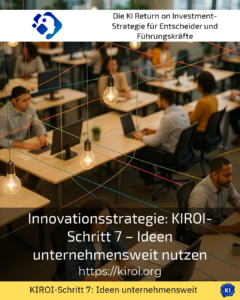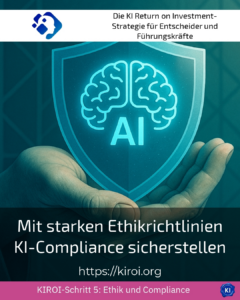Redesigning knowledge exchange in companies
The conventional exchange of knowledge in organisations often still functions according to traditional patterns. Many decision-makers encounter challenges such as loss of information, lack of time or lack of transparency. It is therefore important to rethink knowledge sharing processes. The KIROI initiative offers managers in particular a helpful introduction to successfully tackling this challenge. Decision-makers can receive impulses and support to make knowledge sharing more efficient and sustainable.
The importance of advanced knowledge sharing for decision-makers
Sharing knowledge is more than just passing on information. It is about making existing expertise structured and accessible in order to enable better decisions and promote innovation. Many managers report that targeted support in the use of new technologies and methods helps them to improve knowledge sharing in a targeted manner. It is important not only to collect knowledge, but also to promote the culture in the company in such a way that employees are motivated to actively share their knowledge.
An example from industry shows how modern communication platforms can improve the exchange of knowledge across industries. In the automotive industry, a company is helping its employees to understand and apply technical innovations more quickly by exchanging information in virtual communities. Another example from the mechanical engineering sector shows how the structured documentation of empirical values facilitates the exchange of knowledge between different locations, thereby avoiding errors.
KIROI BEST PRACTICE at company XYZ (name changed due to NDA contract) A manufacturing company integrates modular learning and communication methods to make the exchange of knowledge not only documentary but also interactive. In this way, project teams are specifically supported in the use of new digital tools. Managers receive regular impulses to promote the continuous transfer of knowledge, which strengthens innovative power.
How KIROI supports knowledge exchange projects
KIROI does not provide managers with quick fixes, but with support that guides them step by step through the challenges of modern knowledge exchange. Individual needs are addressed and impulses are given on how digital tools and changed communication structures can be meaningfully integrated. Clients often report that this support significantly facilitates projects, especially in the implementation phase, and increases acceptance among employees.
Digital knowledge platforms also enable the secure exchange of complex expertise in the pharmaceutical industry. KIROI helps decision-makers to design these platforms in a customer-orientated and user-friendly way so that knowledge sharing is not only technically possible, but really comes to life. Another example from the energy sector illustrates how targeted training can improve the transfer of knowledge between experienced and new employees and avoid downtime.
KIROI BEST PRACTICE at company XYZ (name changed due to NDA contract) In a service company, a knowledge management project was supported as part of a KIROI coaching programme. The managers were supported in identifying internal knowledge barriers and promoting dialogue in interdisciplinary teams through targeted workshops. This led to improved project quality and a noticeable reduction in frictional losses.
Practical tips for decision-makers to improve knowledge sharing
Decision-makers who want to rethink the exchange of knowledge in their company should first analyse existing communication channels and be open to new methods. The integration of digital tools can support this, but the focus must always be on people. Transparent communication about the goals and benefits for all those involved often helps to create acceptance and motivation for knowledge sharing. Moderated workshops or coaching programmes, such as those offered by KIROI, can also provide important impetus.
An example from the logistics industry shows how short, regular knowledge-sharing meetings can break down silos and speed up the flow of information. In the food industry, an approach was chosen in which employees were actively involved in the design of knowledge exchange formats. This led to significantly greater participation and improved results in the introduction of new products.
KIROI BEST PRACTICE at company XYZ (name changed due to NDA contract) A healthcare company focussed on targeted coaching for managers in order to reflect on and further develop knowledge exchange processes. The accompanied introduction of a digital knowledge portal enabled important knowledge to be shared more effectively and team collaboration to be organised more efficiently. As a result, the quality of internal training courses increased sustainably.
My analysis
Knowledge sharing is a key success factor in companies, but it is often not considered systematically enough. In my experience, decision-makers particularly benefit from personalised support that provides impetus and concrete tools. KIROI offers a supportive role here, which helps to achieve sustainable results, especially in complex projects, without making unrealistic promises of effectiveness. The combination of technical expertise and change support seems to have proven its worth in many sectors.
Further links from the text above:
[1] A Complete Blog Post SEO Checklist to Boost Rankings
[2] How to write SEO blog posts that rank and convert
[3] 10 tips for an awesome and SEO-friendly blog post
[5] How To Write a Blog Post: A Step-By-Step Guide
For more information and if you have any questions, please contact Contact us on the topic or read more blog posts on the topic Artificial Intelligence Blog here.












